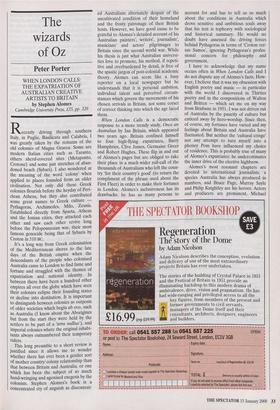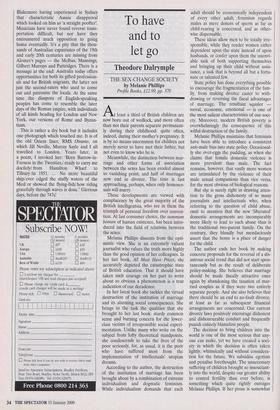The wizards of Oz
Peter Porter
WHEN LONDON CALLS: THE EXPATRIATION OF AUSTRALIAN CREATIVE ARTISTS TO BRITAIN by Stephen Alomes Cambridge University Press, £35, pp. 320 Recently driving through southern Italy, in Puglie, Basilicata and Calabria, I was greatly taken by the remains of the old colonies of Magna Graeca. Some are modern Italian cities such as Taranto, others sherd-covered sites (Metaponto, Crotone) and some just stretches of aban- doned beach (Sybari). I also wondered at the meaning of the word 'colony' when applied to places founded from an older civilisation, Not only did these Greek colonies flourish before the heyday of Peri- clean Athens, but they also contributed some great names to Greek culture — Pythagoras, Archimedes, Milo, Zeuxis. Established directly from Sparta, Athens and the Ionian cities, they attacked each other and saw each other revive long before the Peloponnesian war, their most famous genocide being that of Sybaris by Croton in 510 BC.
It's a long way from Greek colonisation of the Mediterranean shores to the late days of the British empire when the descendants of the people who colonised Australia came to London to find fame and fortune and struggled with the themes of expatriation and national identity. In between there have been a hundred other empires all over the globe which have seen their colonies eclipse their founding states or decline into destitution. It is important to distinguish between colonies as outposts of older societies which begin ab ovo, such as Australia (I know about the Aborigines but from the start they were held by the settlers to be part of a 'terra nullius), and imperial colonies where the original inhabi- tants always outnumbered their temporary rulers.
. This long preamble to a short review is Justified since it allows me to wonder Whether there has ever been a gentler sort of mother country/ colony relationship than that between Britain and Australia, or one Which has been the subject of so much hand-wringing and agonised exegesis by the colonists. Stephen Alomes's book is a concentrated cry of anguish as discontent- ed Australians alternately despair of the uncultivated condition of their homeland and the frosty patronage of their British hosts. However, we have good cause to be grateful to Alomes's detailed account of his Australian painters', writers', journalists', musicians' and actors' pilgrimages to Britain since the second world war. While his thesis is just what Australian universi- ties love to promote, his method, if repeti- tive and overburdened by detail, is free of the spastic jargon of post-colonial academic theory. Alomes can seem like a busy reporter on a local newspaper but he understands that it is personal ambition, individual talent and perceived circum- stances which govern the movements of his chosen arrivals in Britain, not some corset of correct thinking into which the age laced them.
When London Calls is a democratic response to a more trendy study, Once an Australian by Ian Britain, which appeared two years ago. Britain confmed himself to four high-flying expatriates, Barry Humphries, Clive James, Germaine Greer and Robert Hughes. These flip in and out of Alomes's pages but are obliged to take their place in a much wider roll-call of the thousands of Australians who left the coun- try 'for their country's good' (to return the compliment of the phrase used about the First Fleet) in order to make their fortunes in London. Alomes's inclusiveness has its drawbacks: he has so many persons to account for and has to tell us so much about the conditions in Australia which drove sensitive and ambitious souls away that his text is topheavy with sociological and historical summary. He would no doubt have assessed the driving forces behind Pythagoras in terms of 'Croton ver- sus Samos', ignoring Pythagoras's profes- sional concern for philosophy and government.
I have to acknowledge that my name occurs often in When London Calls and I do not dispute any of Alomes's facts. How- ever, I believe that it was my obsession with English poetry and music — in particular with the world I discovered in Thirties poetry and in the compositions of Walton and Britten — which set me on my way from Brisbane in 1951. I was not driven out of Australia by the paucity of culture but enticed away by hero-worship. Since then, of course, my fortunes have varied and my feelings about Britain and Australia have fluctuated. But neither the 'cultural cringe' nor any attempt to turn myself into a phoney Porn have influenced my choice of residence. This is probably true of many of Alomes's expatriates: he underestimates the inner drive of the elective highbrow.
Alomes's most resonant chapters are devoted to international journalists, a species Australia has always produced in numbers, and Bruce Page, Murray Sayle and Philip Knightley are his heroes. Actors and producers are prominent, Michael Blakernore having experienced in Sydney that characteristic Aussie disapproval which looked on him as 'a straight poofter'. Musicians have never found reverse trans- portation difficult, but nor have they encountered much opposition to going home eventually. It's a pity that the thou- sands of Australian expatriates of the 19th and early 20th centuries are missing from Alomes's pages — the Melbas, Mannings, Gilbert Murrays and Partridges. There is a message at the end: Australia today offers opportunities for both its gifted profession- als and for British migrants, the latter not just the second-raters who used to come out and patronise the locals. At the same time the diaspora of English-speaking peoples has come to resemble the later days of the Roman empire, with individuals of all kinds heading for London and New York, our versions of Rome and Byzan- tium.
This is rather a dry book but it includes one photograph which touched me. It is of the old Orient liner, RMS Otranto, on which Jill Neville, Murray Sayle and I all travelled to London. Years later, in a poem, I invoked her: 'Born Barrow-in- Furness in the Twenties,/ ready to carry me docilely/ from Hamilton Wharf to Tilbury /in 1951. ... No more beautiful ship/ever edged the stuffy waters of the Med/ or showed the flying-fish/ how riding gracefully through waves is done.' Glorious days, before the 747s1



























































 Previous page
Previous page